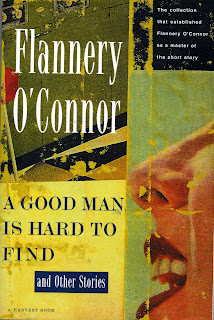 I got this here book at Book People after I read a story in the New York Times. It was in the travel section, where I can go anywhere in the world for free, and appeared on February 4th, the day after my birthday, and was titled "In Search of Flannery O`Connor" by Lawrence Downes. He took a trip to Andalusia, which is the farmhouse where Flannery grew up; that`s Milledgeville, between Atlanta and Savannah, Georgia, a fairyland for we Texans. Yea, rather deep in the heart of Dixie! There were photos of the dary farmhouse and a snap of her old typewriter; one could deflect a thimble of inspiration from seeing her bedroom where she wrote religiously for three hours everyday. I was drawn to her because I was curious what is meant by "the Southern writer"? What does that really mean? I picked up "The Sound And The Fury" by William Faulkner a couple of weeks ago, and I am about half way through it. This Norton Critical Edition has some essays that discuss the "Southern Thing", but this novel was published in 1929, just as The Depression was beginning. Flannery O`Connor`s stories were published more from the mid-fifties to the early sixties. She died from Lupus in 1964, and thus she must have experienced the beginnings of the Civil Rights Movement. She deals with the issue of race, but mainly through the bigotted veneer of her raspy, rascally heroes and villains.
I got this here book at Book People after I read a story in the New York Times. It was in the travel section, where I can go anywhere in the world for free, and appeared on February 4th, the day after my birthday, and was titled "In Search of Flannery O`Connor" by Lawrence Downes. He took a trip to Andalusia, which is the farmhouse where Flannery grew up; that`s Milledgeville, between Atlanta and Savannah, Georgia, a fairyland for we Texans. Yea, rather deep in the heart of Dixie! There were photos of the dary farmhouse and a snap of her old typewriter; one could deflect a thimble of inspiration from seeing her bedroom where she wrote religiously for three hours everyday. I was drawn to her because I was curious what is meant by "the Southern writer"? What does that really mean? I picked up "The Sound And The Fury" by William Faulkner a couple of weeks ago, and I am about half way through it. This Norton Critical Edition has some essays that discuss the "Southern Thing", but this novel was published in 1929, just as The Depression was beginning. Flannery O`Connor`s stories were published more from the mid-fifties to the early sixties. She died from Lupus in 1964, and thus she must have experienced the beginnings of the Civil Rights Movement. She deals with the issue of race, but mainly through the bigotted veneer of her raspy, rascally heroes and villains.I`ve only read maybe five short stories so far, but am just blown away; the impression I get is like Bonny and Clyde, bullets and romance, the lonely, or the lost and forgotten ("The Grapes of Wrath" is recalled) . I think I will go back to Book People today and see if I can grab "The Violent Bear It Away" or "Wise Blood", her only two novels. I heard that many of her letters may soon be published too, and this will reveal more about her peculiar demeanor, her take on the South, and the tense religious chasm that bubbled under her feet like Dante`s Inferno. This is a general page from which you can read more `bout the belle Flannery and her peacocks, cornpone or jangling trolleys! I just read "The Artificial Nigger" last night and really came away with unusual feelings in my gut. I had grown up in Houston in the early sixties and was use to the two-tiered society and the symbolic division between the have and have nots, between the suburbs and alternative society across the railroad tracks. What I take away is that when Mr Head and Nelson see the little black yard effigy in an upper-crust anglo neighborhood, they were relieved that those people had been put back in their place(they saw the effigy as this type of symbol). When they visited a real black town of Atlanta, and talked to the sultry, sassy mamma, they were frightened out of their wits! Oddly, the epiphany experienced by Mr. Head is more the conviction that the social stratas remain firmly in place. This is a twisted irony as such, and his struggle with God for his sins of denial, when Nelson was in need of service, do not retain a strain of sincerity. Rather, his bigoted world remains in tact! Indeed, very unusual-but maybe that`s the way it really went down with many of these rapscallions. Also, the language is a literary gold mine, and many of the lines require innumerable re-readings, where the meanings shift as shades of light on a Monet haystack. The treetops, fencing the junction like the protecting walls of a garden, were darker than the sky which was hung with gigantic white clouds illuminated like lanterns.
I really wonder how Flannery could of thought up all these stories, unless she just had an incredible,...a vivid or even wild imagination. She most certainly did have one. I read that Sherman`s March went right through that area of Georgia. I had just seen a good special on Sherman on The History Channel about a month ago, and I knew that the resentments felt by Southerners were yet still smoldering, if not flaming. I`m inclined to believe that some of that is baked into Flannery`s cake mix, her literary daffodils. When I was reading "A Good Man Is Hard To Find" I kept thinking of Key Largo and Humphrey Bogart as the crook holding those good people captive. Yea, he seemed like the Misfit, very ornery and up to no good-hey, down right pure evil! When I was young, in the early sixties, we drove through the deep south, and I saw cotton fields, wooden shacks with poor children playing, run-down gas stations with rinky dink coca-cola machines, home-cookin` diners, town folk scurrying to the bus stop....some of this must have been part of Flannery`s world? "The River" has a bad ending and "The Life You Save May Be Your Own" is about a flim-flam man, a confidence artist who takes an old woman and her over-ripe daughter for a ride, but you still sympathize with him when he abandons the daughter...uncooth but whew, he got away! I kept thinkin` of Jack Nicholson in "Five Easy Pieces" bailin` and leavin` Karen Black at the truck stop. I just found out that Wise Blood had been made into a movie (1979) with Brad Dourif, Ned Beatty, and Harry Dean Stanton-gonna snatch it up quicker than a flapjack on a Kettle griddle! I`m gonna read more of her works and skirt some of the issues about her Southern-ness. An undulating (developing) theory I have, is that the closer the writer is to the Civil War, or maybe to the Antebellum Period, the more unique they are...the more Southern by nature. Thus, since Faulkner wrote much in the twenties, he is more Southern than Flannery O`Connor! No doubt, this theory may have to jump many treacherous, fiery hoops... but hopefully the circus tent won`t burn down?? Last night a funny moniker came to mind, and it has been stickin` so far-Little Miss Southern Discomfort! She is a fireball, an enigma where Catholicism and Protestantism are wrestling furiously, with her surprise endings and characters who long for redemption but are tethered by their own gremlins!


No comments:
Post a Comment